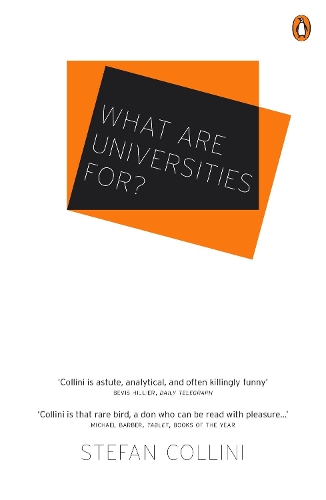
What are Universities For
(Paperback)
Publishing Details
What are Universities For
By (Author) Stefan Collini
Penguin Books Ltd
Penguin Books Ltd
22nd February 2012
23rd February 2012
United Kingdom
Classifications
Tertiary Education
Non Fiction
378
Physical Properties
Paperback
240
Width 130mm, Height 198mm, Spine 14mm
182g
Description
Across the world, we have more universities than ever yet are also increasingly sceptical about their value. What Are Universities For presents a spirited, compelling argument for rethinking the way we see these institutions, and why we need them. Stefan Collini challenges the idea that universities must show their contribution to economic growth; instead, he argues, we must recognize the inherent worth of intellectual enquiry, and the complexity of harnessing this to immediate financial goals - particularly in the case of the humanities, which can seem the most difficult subjects to justify but may be among the most valuable. Collini's critiques of the higher education policies of successive governments are devastating but constructive. At a time when the future of higher education lies in the balance, What Are Universities For offers us a deeper, more persuasiveunderstanding of why universities matter - to everyone. In recent years, Stefan Collini has become one of the most important critical voices in debates about universities and their future. He is Professor of Intellectual History and English Literature at Cambridge University.
Reviews
An eloquent and impassioned book * Economist *
Collini is astute, analytical, and often killingly funny -- Bevis Hillier * Daily Telegraph *
Collini is that rare bird, a don who can be read with pleasure -- Michael Barber * Tablet, Books of the Year *
One of Britain's finest essayists and writers -- Ronan McDonald * The Times Higher Education Supplement *
[A] timely lecture for the coalition of dunces ... this is a closely argued defence * Independent on Sunday *
The book is a bit like some university courses. It is erudite, well argued, carefully researched, a fine addition to the debate about the purpose of university education * Scotsman *
[Collini is] stern and splendid in his brief history of the hot debate on useful versus useless knowledge -- Fred Inglis * Times Higher Education *
It is extremely well written: Collini's prose is lively, well-reasoned and persuasive. The book is a refreshing example of a faculty member engaging with the wider issues of higher education rather than perceiving them through the narrow prism of his own discipline ... a valuable, timely contribution to the discourse -- Gerry Wrixon * Irish Examiner *
A critique both pointed and witty -- Howard Newby * Independent *
Collini writes beautifully -- Chris Patten * Financial Times *
Collini puts his finger on the nub of the problem facing universities. Collini's book is a must-read -- AC Grayling * Literary Review *
Author Bio
Stefan Collini has become one of the most respected voices in public debates about universities and their place in modern society.He is a Professor of Intellectual History and English Literature at Cambridge University and Fellow of the British Academy, who frequently contributes to The Guardian,The London Review of Books,The Times Literary Supplement and The Nation.Reviewers of the recent, Common Reading: Critics, Historians,Publics (2008), described him as 'one of Britain's finest essaysists and writers.'Other works include Absent Minds: Intellectuals in Britain (2006),Public Moralists (1991),Matthew Arnold: a Critical Portrait (1994) and English Pasts: Essays in History and Culture (1999).
